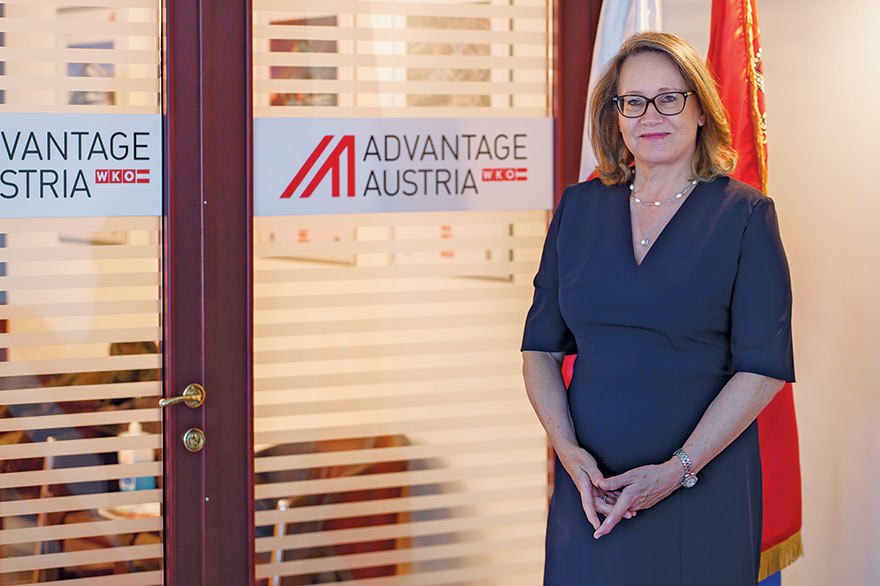After a very successful 2019, the Austrian-Serbian trade exchange fell by roughly 17% in the first six months of 2020. However, with the support of Advantage Austria, companies from both sides of the aisle are trying their best to preserve contacts and cooperation
Erika Teoman-Brenner, Commercial Counsellor of the Austrian Embassy, had previously faced challenging moments in her previous postings, such as the financial crisis of 2008/2009 or terrorist bombings in her immediate surroundings.
“However,” she insists, “this pandemic is nothing like anything before”. Yet, throughout all these perplexing times, the greatest strength of ADVANTAGE AUSTRIA has been its commitment to connect people and build partnerships with value. That’s also exactly what they’re doing now, by helping companies to navigate their ways through complex issues of maintaining physical contacts and spurring innovation.
What kinds of trends have you noticed in the trade exchange between Austria and Serbia during 2020? What are the forecasts like as we head towards 2021?
– After a very successful 2019, with bilateral trade achieving an all-time high of 1.5 billion euros, we witnessed a decline this year, due to the pandemic. Based on the latest data – covering the first six months of this year – our bilateral trade has declined by roughly 17%. Basically, all product groups have been impacted, which reflects an overall contraction of demand in Europe.
Against this general trend, we witnessed an increase in Austrian deliveries of pharmaceuticals to Serbia, while during the same period Serbia exported almost twice as much frozen fruit as last year. It is practically impossible to predict developments for the next year, given the uncertainty of the evolution of the pandemic, but we certainly hope that our bilateral trade will grow again. This will not only be a function of the situation in our two countries, but more that of a global economic recovery, given the extent to which our companies are integrated into international production chains.
How did Austrian companies that operate in Serbia cope with the altered circumstances for doing business?
– First and foremost, they ensured that their employees were as safe as possible by maintaining all necessary social distancing protocols. At the outbreak of the pandemic, the biggest challenge was probably to deal with the interruption of supply chains and the implementation of all necessary systems to support remote working. In order to get a clearer picture, though, we are awaiting the results of our upcoming annual investors’ survey. In any case, what we have witnessed so far is that our companies adapted very quickly to these extraordinary circumstances.
Austrian companies took every action to protect not only the health of their employees, but also to preserve their workplaces, and by doing so they contributed greatly to maintaining employment in these difficult times.
What challenges are today confronting the companies that address you most often; how much have those challenges changed since the outbreak of the pandemic?
– When we talk about challenges to doing business in Serbia, they have remained quite unchanged over the years. They are generally linked to administrative and regulatory issues, but also to low growth of domestic consumption and investments. Since the outbreak of the pandemic, our companies have obviously had to face a number of unexpected problems.
On a practical level, travel restrictions were probably the most challenging, given the geographical proximity and close business relations between companies in Austria and Serbia, and – last but not least – the large number of Serbian citizens commuting between the two countries. It is fair to say that our office has become a very important – and appreciated, if I may add – point of reference for Austrian and Serbian companies seeking up-to-date information on travel regulations.
What has represented the positive side of the COVID-19 crisis when it comes to innovation? How active have Austrian companies been in this field?
– We probably all agree that COVID-19 has impacted nearly every aspect of life, from the way people live and work, to the ways companies operate and interact with their customers. As a response to this, a number of innovative products and services have entered the market. Looking at Austrian companies, there have been some interesting innovations, such as a contact tracing app for the hospitality industry or a DIY Corona test kit sold through drug stores. Another start-up offers free Youtube workshops for maintaining mental health during times of crisis.

At the same time, you are also involved actively in fostering innovation as a way of supporting sustainable development in the region of the Western Balkans. Can you tell us more about the outcomes of these initiatives?
– We are indeed involved in a joint initiative of the Austrian Development Agency and the Austrian Research Promotion Agency that aims at supporting the establishment of cross-border partnerships between Austria and the Western Balkans that contribute to the Sustainable Development Goals through so-called frugal innovation, a concept that is quite new in this region. We are still in the initial phase, but the talks we’ve had so far with potential partners have proved promising.
How have Austrian companies contributed to Serbia combatting the consequences of the pandemic?
– Immediately after the outbreak of the pandemic, a number of Austrian companies in Serbia donated protective equipment and ventilators to various Serbian organisations. But what is probably more important is that they continue to be totally committed to their operations in Serbia, and to their employees in particular. They take every action to protect not only their health, but also their workplaces, and by doing so they contribute greatly to maintaining employment in these difficult times.